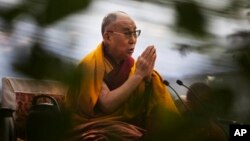China on Wednesday urged the exiled Tibetan spiritual leader, the Dalai Lama, to “put aside his illusions” about talks on Tibet's future and accused him of insincerity and covertly pushing for independence, rather than autonomy.
China has ruled Tibet with an iron fist since troops “peacefully liberated” the region in 1950. The Dalai Lama fled into exile in India in 1959 after an abortive uprising against Chinese rule.
Representatives of the Nobel Peace laureate held rounds of talks with China until 2010, but formal dialogue has stalled amid leadership changes in Beijing and a crackdown in Tibet.
In a lengthy white paper released by the official Xinhua news agency, the government said that having failed to use violence to achieve their goals, the Dalai Lama and his supporters had little understanding of modern Tibet and “a sentimental attachment to the old theocratic feudal serfdom.”
“The only sensible alternative is for the Dalai Lama and his supporters to accept that Tibet has been part of China since antiquity, to abandon their goals of dividing China and seeking independence for Tibet,” it said.
“The central government hopes that the Dalai Lama will put aside his illusions in his remaining years and face up to reality,” the government said in the white paper, released in both English and Chinese.
Beijing has been disappointed that the Dalai Lama remains committed to the Middle Way - which he says merely seeks genuine autonomy for the Himalayan region - and this is something China cannot accept, as its real goal is still independence, it added.
“None of the negotiations were conducted in good faith - it was always the intention of the Dalai Lama and his supporters to divide China and achieve independence for Tibet,” it added.
The Tibetan government in exile, based in India, said in an emailed statement that condemning the Middle Way showed Beijing's failure to come up with an alternative.
“The Middle Way Policy seeks genuine autonomy within the framework of the constitution of the People's Republic of China which is a win-win proposition for all parties and one lauded throughout the world including various governments,” it said.
The Dalai Lama denies espousing violence and says he only wants genuine autonomy for Tibet, though China repeatedly has said he is insincere.
China has recently stepped up its rhetoric against the Dalai Lama. He is being received by fewer and fewer foreign leaders in recent years, because of the anger it draws from China, the world's second-largest economy.




